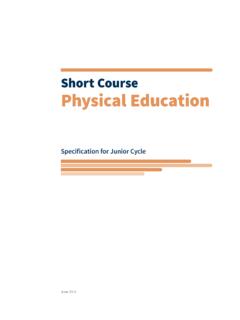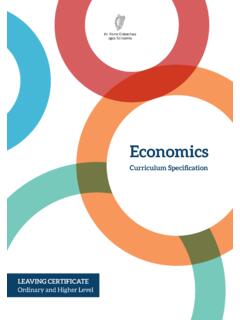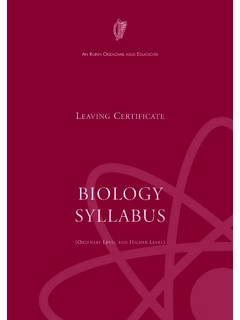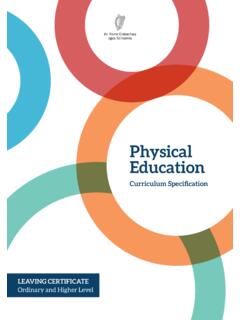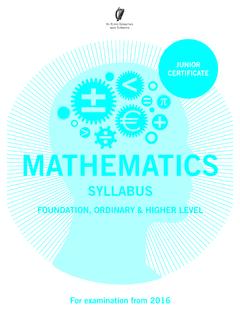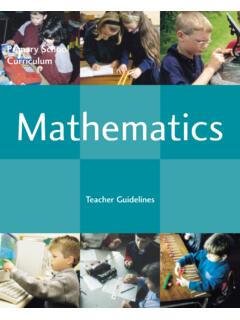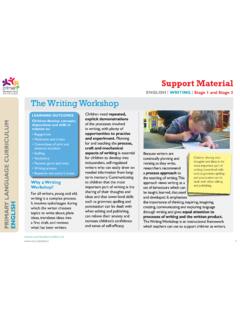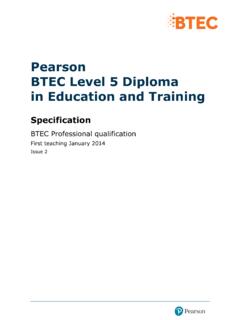Transcription of NCCA Specification for Leaving Cert Agricultural Science
1 Agricultural Science Curriculum SpecificationLEAVING CERTIFICATEO rdinary and Higher LevelAgricultural Science Curriculum Specification2 ContentsSenior cycle ..3 The experience of senior cycle ..3 Leaving Certificate Agricultural Science ..6 Introduction ..6 Rationale ..6 Aims ..7 Objectives ..8 Related learning ..8 Overview of the Specification ..11 Structure ..11 Strands of study ..11 Time allocation ..12 Literacy and numeracy ..12 Key skills ..13 Teaching and learning ..14 Coursework ..15 Assessment to support learning ..15 Strand 1: Scientific practices ..16 Strand 2: Soils ..18 Strand 3: Crops ..20 Strand 4: Animals ..22 Assessment ..25 Differentiation ..25 Assessment components ..25 Written assessment ..26 Coursework ..27 Assessment criteria.
2 28 Reasonable accommodations ..29 Appendix ..30 Agricultural Science Curriculum Specification31 Senior cycleStudents in senior cycle are approaching the end of their time in school and are focusing on the directions they would like to take in their future lives. Senior cycle plays a vital role in helping students to address their current needs as young adults and in preparing them for life in a changing economic and social cycle is founded on a commitment to educational achievement of the highest standard for all students, commensurate with their individual abilities. To support students as they shape their own future there is an emphasis on the development of knowledge and deep understanding; on students taking responsibility for their own learning; on the acquisition of key skills; and on the processes of learning.
3 The broad curriculum, with some opportunities for specialisation, supports continuity from junior cycle and sets out to meet the needs of students, some of whom have special educational needs, but who all share a wide range of learning interests, aptitudes and components at senior cycle promote a balance between knowledge and skills, and the kinds of learning strategies relevant to participation in, and contribution to, a changing world where the future is in senior cycle involves gathering, interpreting and using information about the processes and outcomes of learning. It takes different forms and is used for a variety of purposes. It is used to determine the appropriate route for students through a differentiated curriculum, to identify specific areas of difficulty or strength for a given learner, and to test and certify achievement.
4 Assessment supports and improves learning by helping students and teachers to identify next steps in the teaching and learning experience of senior cycleThe vision of senior cycle sees the learner at the centre of the educational experience. That experience will enable students to be resourceful, to be confident, to participate actively in society, to build an interest in learning, and to develop an ability to learn throughout their vision of the learner is underpinned by the values on which senior cycle is based and it is realised through the principles that inform the curriculum as it is experienced by students in schools. The curriculum, made up of subjects and courses, embedded key skills, clearly expressed learning outcomes, and supported by a range of approaches to assessment, is the vehicle through which the vision becomes a reality for the a practical level, the provision of a high-quality educational experience in senior cycle is supported by effective curriculum planning, development, organisation and evaluation teaching and learning approaches that motivate and interest students, that enable them to progress, that deepen and apply their learning.
5 And that develop their capacity to reflect on their learning professional development for teachers and school management that enables them to lead curriculum development and change in their schools a school culture that respects students, that encourages them to take responsibility for their own learning over time, and that promotes a love of Science Curriculum Specification4 Senior cycle education is situated in the context of a broader education policy that focuses on the contribution that education can make to the development of the learner as a person and as a citizen. It is an education policy that emphasises the promotion of social cohesion, the growth of society and the economy, and the principle of sustainability in all aspects of 1: Overview of senior cycleTHE SENIOR CYCLE CURRICULUM learning outcomeskey skillssubjectsshort coursestransition unitsassessmentcertificationguidancePRIN CIPLES qualityinclusive educationcontinuitychoice and flexibilityparticipation, relevance and enjoymentwell-beingcreativity and innovationlifelong learningVALUES human dignity and respectequality and inclusionjustice and fairnessfreedom and democracyLEARNERS resourceful, confident, engaged and activePlanningTeaching and LearningSchool CultureTeacher Professional DevelopmentTHE SENIOR CYCLE CURRICULUMPRINCIPLESVALUES Agricultural Science Curriculum Specification5 Figure 2.
6 The vision of the learnerLEARNERS resourceful, confident, engaged and activeENGAGED they participate in the social, community, national and international dimensions of their lives byshowing respect for othersforming and sustaining caring relationshipsmaking informed decisionsbuilding practical know-howtaking interest in and responsibility for their social and physical environmentdeveloping moral/ethical and political understandingmaking lifestyle choices that are sustainablecontributing to their own material wellbeing and the material wellbeing of societyACTIVE LEARNERS they pursue excellence in learning to the best of their ability and develop a love of learning by seeking and using knowledge, and understanding how knowledge is createdexperiencing passion for, rigour in and commitment to learningdeveloping intellectual and critical thinking skillsexercising autonomy and independence in learningmanaging their learning and making learning choicessetting and achieving learning goalspursuing learning qualificationsRESOURCEFUL they show their imagination, intelligence, intuition and other talents throughcuriosityenquiryopen-mindednessre flectionconnecting learninginnovationproblem solvingcreativityCONFIDENT they develop their physical and mental well-being andbecome self-awarehave high self-efficacyengage with ethics.
7 Values and beliefswelcome opportunitiescan cope with setbackscan effect positive changeAgricultural Science Curriculum Specification62 Leaving Certificate Agricultural ScienceIntroductionScience education provides a means by which students can interact with the world around them and understand how scientific concepts can be used to interpret the natural and physical world. As students scientific literacy grows, they are able to make sense of the various ways in which scientific knowledge is communicated. Scientific knowledge is constructed by the sharing of ideas and by developing, refining, and rejecting or accepting these ideas. Through engagement with Science , students will acquire the knowledge, skills, attitudes and values that will allow them to take informed positions on scientific issues.
8 As well as developing a knowledge of Science , they will also develop a knowledge about the nature of Science , including its moral and ethical Certificate Agricultural Science is the study of the Science and technology underlying the principles and practices of modern agriculture. It is a scientific approach to the knowledge and understanding, skills and attitudes that affect the long-term sustainability of natural resources the land, plants, and animals and places particular emphasis on the sustainable use of these resources for the economic and social benefit of Agricultural Science , an understanding of human use of the Earth s natural resources and environment for the production of food and non-food materials is developed. The Science and technology employed is identified and explored, and an awareness of the need to enhance environmental quality through greater scientific understanding of Agricultural principles and practices is promoted.
9 The role and importance of strategies and policies for the continued sustainable development and growth of the agri-food industry are recognised, whilst understanding the importance of biodiversity, animal welfare and care of the Science can make a significant contribution to the scientific, aesthetic and moral education of young people through its focus on knowledge, processes, methods and context, and through its investigative laboratory and field-based activities, independent and guided research and study, projects and assignments. The scientific concepts in Leaving Certificate Agricultural Science arise from the basic investigative nature of the subject and an integrated approach to teaching it. Scientific principles are applied to testing stated hypotheses, which in turn leads to the solving of identified problems arising from the learner s own observations and perceptions of Agricultural Science Curriculum Specification7 Through a study of Agricultural Science , students develop many practical skills when handling, observing and investigating plants and animals and through the range of other practical activities encountered.
10 Similarly, they learn skills of analysis and interpretation of data, hypothesis formulation, and the designing and planning of investigations. Through individual or group investigations students are given the opportunity for scientific research. In undertaking collaborative group work, they gain experience of communicating, interacting and working with others. Therefore, the progressive development of scientific inquiry, problem-solving, curiosity and self-confidence in the learner will be facilitated through guided discovery, laboratory and field work, experimental investigations, and field-based study of Agricultural Science involves personal involvement of the student with the scientific world by acknowledging the daily application of Science to the life and work of those engaged in the Agricultural and food sectors.

